
Franklin Patrick Herbert Jr. was an American science-fiction author, best known for his 1965 novel Dune and its five sequels. He also wrote short stories and worked as a newspaper journalist, photographer, book reviewer, ecological consultant, and lecturer.

Kevin James Anderson is an American science fiction author. He has written spin-off novels for Star Wars, StarCraft, Titan A.E. and The X-Files, and with Brian Herbert is the co-author of the Dune prequel series. His original works include the Saga of Seven Suns series and the Nebula Award–nominated Assemblers of Infinity. He has also written several comic books, including the Dark Horse Star Wars series Tales of the Jedi written in collaboration with Tom Veitch, Dark Horse Predator titles, and The X-Files titles for Topps. Some of Anderson's superhero novels include Enemies & Allies, about the first meeting of Batman and Superman, and The Last Days of Krypton, telling the story of how Superman's planet Krypton came to be destroyed.

Dune is a 1965 epic science fiction novel by American author Frank Herbert, originally published as two separate serials in Analog magazine. It tied with Roger Zelazny's This Immortal for the Hugo Award for Best Novel and won the inaugural Nebula Award for Best Novel in 1966. It is the first installment of the Dune Chronicles. It is one of the world's best-selling science fiction novels.

Alia Atreides is a fictional character in the Dune universe created by Frank Herbert. She was introduced in the first novel of the series, 1965's Dune, and was originally killed in Herbert's first version of the manuscript. At the suggestion of Analog magazine editor John Campbell, Herbert kept her alive in the final draft. Alia would next appear as a main character in both Dune Messiah (1969) and Children of Dune (1976). The character is brought back as a ghola in the Brian Herbert/Kevin J. Anderson conclusion to the original series, Sandworms of Dune (2007).

Brian Patrick Herbert is an American author who lives in Washington state. He is the elder son of science fiction author Frank Herbert.
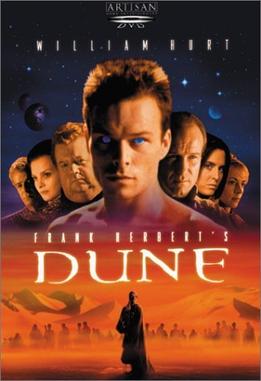
Frank Herbert's Dune is a 2000 science fiction television miniseries, based on the 1965 novel of the same title by Frank Herbert. It is written for the screen and directed by John Harrison, and stars Alec Newman as Paul Atreides, William Hurt as Duke Leto Atreides, and Saskia Reeves as Lady Jessica, along with Ian McNeice, Julie Cox, and Giancarlo Giannini. It was an international co-production between the American cable network Sci Fi Channel, and companies in Germany, Canada, and Italy. This is the second overall filmed adaptation of Herbert’s novel, following the 1984 film directed by David Lynch, and preceding Denis Villeneuve’s two-part film adaptation.
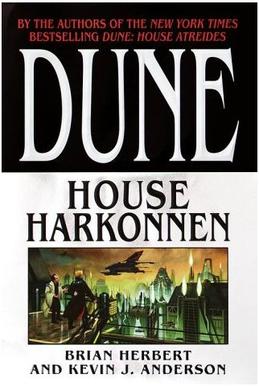
Dune: House Harkonnen is a 2000 science fiction novel by Brian Herbert and Kevin J. Anderson, set in the fictional Dune universe created by Frank Herbert. It is the second book in the Prelude to Dune prequel trilogy, which takes place before the events of Frank Herbert's celebrated 1965 novel Dune. The Prelude to Dune novels draw from notes left behind by Frank Herbert after his death.

Dune: House Corrino is a 2001 science fiction novel by Brian Herbert and Kevin J. Anderson, set in the fictional Dune universe created by Frank Herbert. It is the third book in the Prelude to Dune prequel trilogy, which takes place before the events of Frank Herbert's celebrated 1965 novel Dune. The Prelude to Dune novels draw from notes left behind by Frank Herbert after his death.

Dune is an American science fiction media franchise that originated with the 1965 novel Dune by Frank Herbert and has continued to add new publications. Dune is frequently described as the best-selling science fiction novel in history. It won the inaugural Nebula Award for Best Novel and the Hugo Award in 1966 and was later adapted into a 1984 film, a 2000 television miniseries, and a two-part film series with the first film in 2021 and a sequel in 2024. Herbert wrote five sequels, the first two of which were concomitantly adapted as a 2003 miniseries. Dune has also inspired tabletop games and a series of video games. Since 2009, the names of planets from the Dune novels have been adopted for the real-world nomenclature of plains and other features on Saturn's moon Titan.

Berkley Books is now an imprint of the Penguin Group.
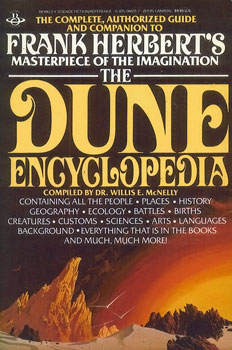
The Dune Encyclopedia is a 1984 collection of essays written by Willis E. McNelly and multiple other contributors as a companion to Frank Herbert's Dune series of science fiction novels.

Dune: House Atreides is a 1999 science fiction novel by Brian Herbert and Kevin J. Anderson, set in the fictional Dune universe created by Frank Herbert. It is the first book in the Prelude to Dune prequel trilogy, which takes place before the events of Frank Herbert's celebrated 1965 novel Dune. Bantam Books made a $3 million deal for the novels in 1997. The Prelude to Dune novels draw from notes left behind by Frank Herbert before his death.

Frank Herbert's Children of Dune is a three-part science fiction television miniseries written by John Harrison and directed by Greg Yaitanes, based on Frank Herbert's novels Dune Messiah (1969) and Children of Dune (1976). First broadcast in the United States on March 16, 2003, Children of Dune is the sequel to the 2000 miniseries Frank Herbert's Dune, and was produced by the Sci Fi Channel. Children of Dune and its predecessor are among the highest-rated programs ever to be broadcast on the Sci-Fi Channel. In 2003, Children of Dune won a Primetime Emmy Award for Outstanding Special Visual Effects, and was nominated for three additional Emmys.
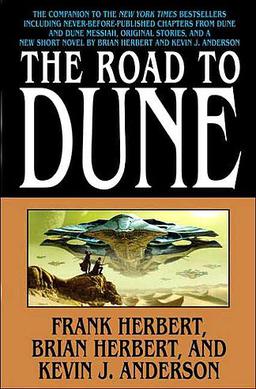
A series of Duneshort stories have been written that relate to the Dune novels by Frank Herbert, Brian Herbert and Kevin J. Anderson. Some of these stories were originally available for download from the official Dune website, released in a promotional capacity in conjunction with the Brian Herbert/Kevin J. Anderson novels. "Dune: A Whisper of Caladan Seas", "Dune: Hunting Harkonnens", "Dune: Whipping Mek", and "Dune: The Faces of a Martyr" were later published as part of the collection The Road to Dune released in September 2005. "Dune: Sea Child" was published in Elemental, a 2006 benefit anthology for children who survived the 2004 Indian Ocean tsunami, and was later made available as part of the paperback edition of The Road to Dune. "Dune: Treasure in the Sand" was published online in 2006 at Jim Baen's Universe, and was later made available as part of the paperback edition of Hunters of Dune. "Dune: Wedding Silk" was released June 12, 2011 in the Dune e-book short story collection Tales of Dune, which also included previously published stories "Dune: Sea Child" and "Dune: Treasure in the Sand." "Dune: Red Plague" was released on November 1, 2016, followed by "Dune: The Waters of Kanly" in October 17, 2017. "Blood of the Sardaukar" was released in March 2019. "Dune: The Edge of a Crysknife" and "Dune: Imperial Court" released on June 28, 2022 in the novella collection Sands of Dune, which also included "The Waters of Kanly" and "Blood of the Sardaukar", which had previously only been published in other short story anthologies.

The Winds of Dune is a science fiction novel written by Brian Herbert and Kevin J. Anderson, set in the Dune universe created by Frank Herbert. Released on August 4, 2009, it is the second book in the Heroes of Dune series and chronicles events between Frank Herbert's Dune Messiah (1969) and Children of Dune (1976). Before publication, the novel's title was initially announced as Jessica of Dune.
This is a list of works by the science fiction author Frank Herbert.
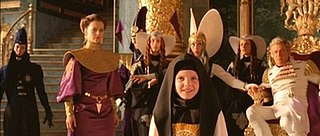
Multiple organizations of the Dune universe dominate the political, religious, and social arena of the setting of Frank Herbert's Dune series of science fiction novels, and derivative works. Set tens of thousands of years in the future, the saga chronicles a civilization which has banned computers but has also developed advanced technology and mental and physical abilities through physical training, eugenics and the use of the drug melange. Specialized groups of individuals have aligned themselves in organizations focusing on specific abilities, technology and goals. Herbert's concepts of human evolution and technology have been analyzed and deconstructed in at least one book, The Science of Dune (2008). His originating 1965 novel Dune is popularly considered one of the greatest science fiction novels of all time, and is frequently cited as the best-selling science fiction novel in history. Dune and its five sequels by Herbert explore the complex and multilayered interactions of politics, religion, ecology and technology, among other themes.
We've a three-point civilization: the Imperial Household balanced against the Federated Great Houses of the Landsraad, and between them, the Guild with its damnable monopoly on interstellar transport.

The Dune prequel series is a sequence of novel trilogies written by Brian Herbert and Kevin J. Anderson. Set in the Dune universe created by Frank Herbert, the novels take place in various time periods before and in between Herbert's original six novels, which began with 1965's Dune. In 1997, Bantam Books made a $3 million deal with the authors for three Dune prequel novels, partially based upon notes left behind by Frank Herbert, that would come to be known as the Prelude to Dune trilogy. Starting with 1999's Dune: House Atreides, the duo have published 15 Dune prequel novels to date.
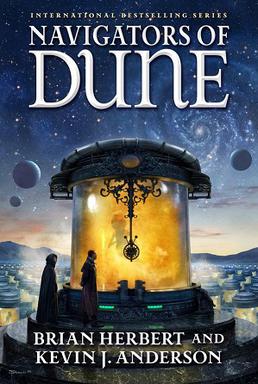
Navigators of Dune is a 2016 science fiction novel by Brian Herbert and Kevin J. Anderson, set in the Dune universe created by Frank Herbert. It is the third book in their Great Schools of Dune prequel trilogy, which itself is a sequel to their Legends of Dune trilogy.
Angels Fall is a 1982 play by Lanford Wilson.

















